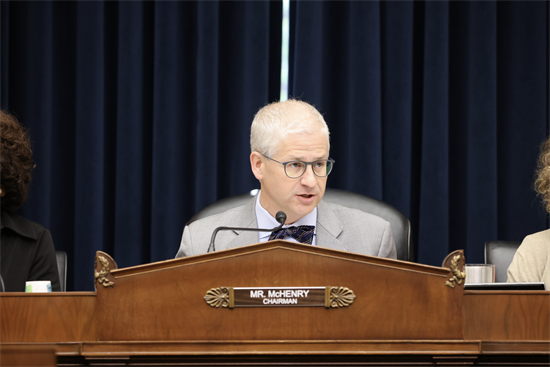Financial Services Committee Advances Legislation to Hold Iran Accountable for Financing Hamas and Terrorism Around the Globe
Washington,
November 14, 2023
Today, the House Financial Services Committee passed eleven bipartisan pieces of legislation in the wake of the barbaric attack on Israel by Iranian-backed Hamas terrorists and ongoing geopolitical turmoil. Included among the bills reported to the House for consideration are measures to further penalize Hamas and Iran for their role in perpetuating violence against Israeli civilians, conduct oversight of the Biden Administration’s sanctions against and dealings with the Iranian regime, and ensure that any humanitarian assistance to Iran is not used to finance acts of terror.
More information on all eleven bills reported out of the Financial Services Committee can be found below:
H.R. 5921, the "No U.S. Financing for Iran Act of 2023," offered by Rep. Bill Huizenga (MI-04), stems the resources available to Iran by prohibiting Treasury from issuing any licenses authorizing a U.S. financial institution to engage in transactions for trade with Iran, other than humanitarian aid benefitting Iranian citizens. The bill also requires the Secretary to oppose IMF assistance to Iran and prohibiting Special Drawing Rights from being allocated to Iran.
H.R. 5923, the "Iran-China Energy Sanctions Act of 2023," offered by Rep. Mike Lawler (NY-17), expands the secondary sanctions regime involving Iran to include all transactions between Chinese financial institutions and sanctioned Iranian banks that handle the purchase of petroleum and petroleum products. The bill requires an annual determination of whether Chinese financial institutions have engaged in sanctionable conduct.
H.R. 6245, the "Holding Iranian Leaders Accountable Act," offered by Rep. French Hill (AR-02), brings transparency to terrorist financing by requiring the President to report on, and subsequently publish, the assets of certain Iranian government officials and terrorist leaders. It also requires Treasury to seek closure of the U.S. and foreign financial institution accounts connected with the assets.
H.R. 6323, the "Iran Counterterrorism Act of 2023," offered by Rep. Young Kim (CA-40), requires Iran to have ceased support for acts of international terrorism as a condition for the President to waive secondary sanctions imposed in connection to the country. The bill also provides for a congressional review process for national security interest waivers of these sanctions.
H.R. 6322, the "End Financing to Hamas and State Sponsors of Terrorism Act," offered by Rep. Bryan Steil (WI-01), requires Treasury to submit to Congress an analysis of major financing sources to Hamas, a description of U.S. multilateral efforts to disrupt illicit financial flows to the group, and an evaluation of efforts to undermine Hamas’s ability to finance armed hostilities against Israel. The bill also requires Treasury to develop a multilateral strategy ensuring that Hamas is incapable of financing global terror. In addition, H.R. 6322 prohibits the Secretary of the Treasury from using the Exchange Stabilization Fund to provide dollars to Iran in return for Special Drawing Rights held by the country.
H.R. 6000, the "Revoke Iranian Funding Act of 2023," offered by Rep. Zach Nunn (IA-03), prevents resources from being diverted to help fund Iran’s proxy wars by rescinding the waiver transmitted to Congress on September 11, 2023, which released Iranian funds for humanitarian purposes from South Korea to Qatar. The bill requires a report on assets held by the government of Iran and certain sanctioned persons.
H.R. 5945, the "Freezing-HAMAS Act," offered by Rep. Dan Meuser (PA-09), negates any sanctions waiver issued pursuant to a U.S. agreement with Iran, including the waiver transmitted to Congress on September 11, 2023, that permitted Iranian access to certain funds held abroad. The bill specifically addresses the waivers issued by Secretary of State Blinken authorizing the transfer of $6 billion in Iranian funds from South Korea to Qatar.
H.R. 6015, the "Iran Sanctions Accountability Act of 2023," offered by Rep. Blaine Luetkemeyer (MO-03), requires the President to issue regulations to ensure that humanitarian exemptions involving Iran sanctions do not facilitate acts of international terrorism or the proliferation of weapons of mass destruction.
H.R. 6367, the "Armed Conflict Migration Act of 2023," offered by Rep. Emmanuel Cleaver (MO-05), would direct the Secretary of the Treasury to instruct the United States Executive Director at each international financial institution to use the voice, vote, and influence of the United States to provide financial assistance to countries that receive an influx of civilian migrants stemming from the armed conflict that has resulted from Hamas’s October 2023 terrorism in Israel, to be used for humanitarian aid for the migrants.
H.R. 6370, the "OFAC Licensure for Investigators Act," offered by Rep. Joyce Beatty (OH-03), requires the Secretary of the Treasury to develop a pilot program within the Office of Terrorism and Financial Intelligence (TFI) and administered by the Office of Foreign Assets Control (OFAC), to allow private-sector firms to conduct nominal financial transactions with sanctioned entities in furtherance of investigations. The program includes regular reporting of the licensed recipients’ findings to OFAC as a condition of the license.
H.R. 6365, the "Stopping Illicit Oil Shipments Act of 2023," offered by Rep. Maxine Waters (CA-43), targets the methods used to disguise vessels employed to transport petrochemical products from sanctioned nations. The bill requires insurance companies, in their agreements, to include shipping coverage termination clauses that would be triggered when a flag state withdraws the registration of a vessel.
### |


